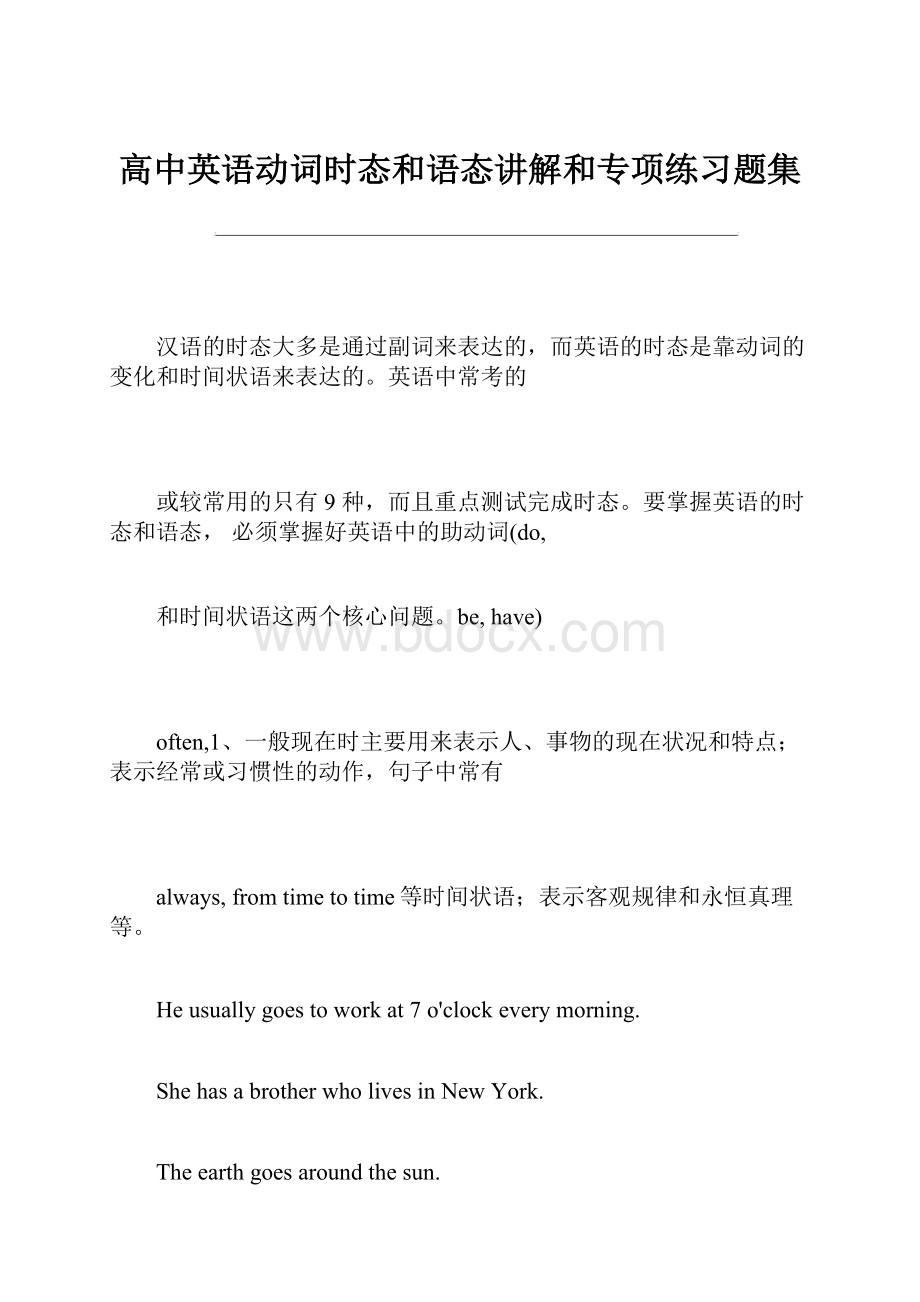 高中英语动词时态和语态讲解和专项练习题集.docx
高中英语动词时态和语态讲解和专项练习题集.docx
- 文档编号:25093448
- 上传时间:2023-06-05
- 格式:DOCX
- 页数:30
- 大小:25.46KB
高中英语动词时态和语态讲解和专项练习题集.docx
《高中英语动词时态和语态讲解和专项练习题集.docx》由会员分享,可在线阅读,更多相关《高中英语动词时态和语态讲解和专项练习题集.docx(30页珍藏版)》请在冰豆网上搜索。

高中英语动词时态和语态讲解和专项练习题集
汉语的时态大多是通过副词来表达的,而英语的时态是靠动词的变化和时间状语来表达的。
英语中常考的
或较常用的只有9种,而且重点测试完成时态。
要掌握英语的时态和语态,必须掌握好英语中的助动词(do,
和时间状语这两个核心问题。
be,have)
often,1、一般现在时主要用来表示人、事物的现在状况和特点;表示经常或习惯性的动作,句子中常有
always,fromtimetotime等时间状语;表示客观规律和永恒真理等。
Heusuallygoestoworkat7o'clockeverymorning.
ShehasabrotherwholivesinNewYork.
Theearthgoesaroundthesun.
GuangzhouissituatedinthesouthofChina.
考点一:
表示永恒的真理,即使出现在过去的语境中,仍用一般现在时。
如:
Ilearnedthattheearthgoes
aroundthesunwhenIwasinprimaryschool.
when,until,after,before,考点二:
在时间和条件状语从句中,代替一般将来时;常用的引导词有:
时间:
条件:
assoonas,once,themoment/theminute,theday;if,unless,provided.
Ifheacceptsthejob,hewillgetmoremoneysoon.
+宾语从句,考点三:
在makesure(certain),seetoit,mind,care,matter从句用一般现在时代替一般
将来时。
tmindwhenhefinishestheexperiment.'Solongasheworkshard,Idon
我不介意他什么时候做完试验。
只要他努力工作,
从句用一般现在时。
考点四:
在themore?
themore?
(越?
?
越?
?
)句型中,若主句是一般将来时
Theharderyoustudy,thebetterresultsyouwillget.
2、现在进行时
表说话时或目前一段时间内正在进行的活动:
或表感情色彩,加强语气。
与频率副词,如always,
等连用表示说话人的某种感情色彩(赞叹、厌烦、埋怨等)。
,constantlycontinually,again
WearehavingEnglishclass.
Thehouseisbeingbuiltthesedays.
Thelittleboyisalwaysmakingtrouble.
考点一:
在时间状语或条件状语从句中表示将来正在进行的动作。
Lookoutwhenyouarecrossingthe
street.
Don'twakehimupifheisstillsleepingat7tomorrowmorning.
表示在最近按计划或安排要进行的动作(这时多有表示将来的时间状语)。
考点二:
MarryisleavingonFriday.
、现在完成时3
表示动作发生在过去,完成在过去,但强调与现在情况仍有联系,其结果或影响仍存在。
现在完成时有一
些标志性的时间状语:
考点一:
for+时间段;since+时间点
TheyhavelivedinBeijingforfiveyears.
TheyhavelivedinBeijingsince1995.
考点二:
常见的不确定的时间状语:
lately;recently,just,already,yet,uptonow;tillnow;sofar,thesedays,
Hasitstoppedrainingyet?
考点三:
在表示“最近几世纪/年/月以来?
?
”时间状语中,谓语动词用现在完成时。
inthepastfewyears/months/weeks/days;overthepastfewyears;duringthelastthreemonths;forthe
等lastfewcenturies,throughcenturies;throughouthistory
考点四:
表示“第几次做某事,+that”后面跟现在”或在“Itisthebest(worst,mostinteresting)+名词
完成时。
ThisismyfirsttimethatIhavevisitedChina.
ThisisthemostinterestingfilmIhaveeverseen.
Thatistheonlybookthathehaswritten.
4.一般过去时
表在过去某个特定时间发生且完成的动作,或过去习惯性动作,不强调对现在的影响,只说明过去。
常跟
明确的过去时间连用,如:
yesterday;lastweek;in1945,atthattime;once;duringthewar;before;afewdaysago;when,注意:
usedto+doto为不定式,后接动词原形。
,表示过去经常但现在已不再维持的习惯动作。
考点一:
be/become/getusedto+doing,表示习惯于
Heusedtosmokealot.
Hehasgotusedtogettingupearly.
考点二:
在时间和条件状语从句中,代替过去将来时。
Hepromisedtobuymeacomputerifhegotaraise
5.过去进行时
表示过去某个时间点或某段时间内正在发生的动作。
Theboywasdoinghishomeworkwhenhisfathercamebackfromwork.
Whatwereyoudoingatninelastnight?
6.过去完成时
表示过去某个时间之前已经完成的动作,即过去完成时的动作发生在“过去的过去”,句中有明显的参照动
作或时间状语,这种时态从来不孤立使用(before,after,by,uptill)
Therehadbeen25parksinourcityuptill2000.Bytheendoflastterm
wehadfinishedthebook.Theyfinishedearlierthanwehadexpected.
句型中,主句用过去完成时,从句用一般过去时。
hardly/scarcely...when;nosooner...thanI考点一:
用于hadhardlyfinishedmyworkwhenhecametoseeme.
Ihadnosoonergotintotheroomthanitbegantosnow.
NosoonerhadIarrivedhomethanthetelephonerang.(注意主谓倒装)
考点二:
表示“第几次做某事”,主句用过去时,从句用过去完成时。
Thatwasthesecondtimethatshehadseenhergrandfather.
Itwas3yearssincewehadparted。
用过去完成时,表示未实现的愿望、考点三:
动词hope,expect,think,intend,mean,want,suppose,plan
打算和意图。
IhadhopedthatIcoulddothejob.
IhadintendedtoseeyoubutIwastoobusy.
7.一般将来时
表在将来某个时间会发生的动作或情况。
常和tomorrow,nextyear,in2008等表示将来的时间状语连用,
其表现形式多达5种。
Beijingwillhostthe29thOlympicGamesin2008.
考点一:
一般将来时总是用在一些时间状语从句或条件状语从句的主句中:
Wewillbeginourclassassoon
astheteachercomes.
(主句用一般将来时,从句中一定要用一般现在时替代一般将来时。
)
考点二:
某些表示短暂性动作的动词如arrive,come,go,leave,start等,用现在进行时形式表示将来。
IamleavingforBeijingtomorrow.
考点三:
“祈使句+and/or+句子”,这种结构中and后面的句子谓语用一般将来时。
Useyourheadand
youwillfindaway.
am(is,are)goingto+“考点四:
”,表示打算要做的事或可能要发生的事。
动词原形
am(is,are)aboutto+“动词原形”表示按照预定计划或打算准备着手进行的动作。
“am(is,are)to+动词原形”表示必须、必然或计划将要做的事。
TheyaretobemarriedinthisMay.
8、将来进行时
表将来某个时间正在发生的动作,或按计划一定会发生的事情。
llbedoingmyhomeworkthistimetomorrow.I'明天这会我正在写作业。
ThePresidentwillbemeetingtheforeigndelegationattheairport.
、将来完成时9
表在将来某时刻之前业已完成的事情,时间状语非常明显。
clockthisevening,byby+将来的时间。
如:
bytheendofthisyear,by8o'考点一:
常用的时间状语一般用
等引导的副词从句。
以及由Marchnextyearbythetime?
before或when
Bytheendofnextmonth,hewillhavetraveled1000milesonfoot.
考点二:
在时间和条件状语从句中,将来完成时则由现在完成时表示。
Thechildrenwilldotheirhomeworkthemomenttheyhavearrivedbackfromschool.
10.动词的语态
动词的语态一般不单独考,而是和时态、语气和非谓语动词一起考,只是需要注意以下考点。
考点一:
不能用于被动语态的动词和词组
cometrue,consistof,takeplace,happen,become,rise,occur,belong,breakout,appear,arrive,die,
fall,last,exist,fail,succeed
Ittookplacebeforeliberation.
well,quite,easily,badly考点二:
下列动词的主动语态表示被动意义,而且常与等副词连用。
;锁lock();wash(洗);sell(卖);read(读);wear(穿);blame(责备)write(写;);)乘坐ride(
Glassbreakseasily.玻璃容易破碎。
Thecarridessmoothly.这车走起来很稳。
Thecaselockseasily.这箱子很好锁。
Thebooksellswell.这本书很畅销。
考点三:
一些常用经典被动句型:
Itissaid?
Itisreported?
Itiswidelybelieved?
,Itisexpected?
Itisestimated?
这些句子一般翻译为“据说?
?
”,“人们认为?
?
”,
而“以前人们认为?
?
”则应该说:
Itwasbelieved?
Itwassaid?
高中英语动词时态和语态专项练习题
语境中的时态和语态具有灵活多变的特点,因此找出隐含于上下文中的时间信息,正确认定
动作行为所发生的时间是解题的关键。
做动词时态和语态填空题时,常常按以下几个步骤:
(1)注意题干所提供的信息,如语境、情景以及说话人的情感;
(2)根据句中的时间状语以及一些副词判断时态;(3)考虑语态;(4)考虑时态的一致性。
另外,复习时,还要涉及到短暂性动词与延续性动词,这两个概念一定要搞清。
短暂性动词用于进行时态和完成时态都要受到限制。
1.—Youhaven'tsaidawordaboutmynewcoat,Brenda.Doyoulikeit?
—I'msorryI________anythingaboutitsooner.Icertainlythinkit'sprettyonyou.
A.wasn'tsayingB.don'tsayC.won'tsayD.didn'tsay
2.IwonderwhyJenny________usrecently.Weshouldhaveheardfromherbynow.
A.hasn'twrittenB.doesn'twriteC.won'twriteD.hadn'twritten
3.—Whenwillyoucometoseeme,Dad?
—Iwillgotoseeyouwhenyou________thetrainingcourse.
A.willhavefinishedB.willfinishC.arefinishingD.finish
4.—Howlong________atthisjob?
—Since1990.
A.wereyouemployedB.haveyoubeenemployed
C.hadyoubeenemployedD.willyoubeemployed
5.Bytheendoflastyear,anothernewgymnasium________inBeijing.
A.wouldbecompletedB.wasbeingcompleted
C.hasbeencompletedD.hadbeencompleted
6.Thelittlegirl________herheartoutbecauseshe________hertoybearandbelieved
shewasn'tevergoingtofindit.
A.hadcried;lostB.cried;hadlostC.hascried;haslostD.cries;haslost
7.—Excuseme,sir.Wouldyoudomeafavor?
—Ofcourse.Whatisit?
—I________ifyoucouldtellmehowtofilloutthisform.
A.hadwonderedB.waswonderingC.wouldwonderD.didwonder
8.HewillhavelearnedEnglishforeightyearsbythetimehe________fromtheuniversity
nextyear.
A.willgraduateB.willhavegraduatedC.graduatesD.istograduate
9.Ifeelitisyourhusbandwho________forthespoiledchild.
A.istoblameB.isgoingtoblameC.istobeblameD.shouldblame
10.Hehasbeenwritingthecompositionthewholemorningandhestill________.
A.hasbeenB.doesC.hasD.is
11.Ifcitynoises________fromincreasing,people________shouttobeheardevenatthe
dinnertable20yearsfromnow.
B.arenotkept;havetoA.arenotkept;willhaveto
D.donotkeep;havetoC.donotkeep;willhaveto
12.Theprice________,butIdoubtwhetheritwillremainso.
A.wentdownB.willgodownC.hasgonedownD.wasgoingdown
13.—Howlong________eachotherbeforethey________married?
—Foraboutayear.
A.havetheyknown;getB.didtheyknow;get
C.dotheyknow;aregoingtogetD.hadtheyknown;got14.Youcan'tmoveinrightnow.Thehouse________.
D.ispaintingA.haspaintedB.ispaintedC.isbeingpainted
15.—Hey,lookwhereyouaregoing!
—Oh,I'mterriblysorry.________.
A.I'mnotnoticingB.Iwasn'tnoticingC.Ihaven'tnoticedD.Idon'tnotice
16.ThereportersaidthattheUFO________easttowestwhenhesawit.A.was
travelingB.traveledC.hadbeentravelingD.wastotravel
17.—Isthisraincoatyours?
—No,mine________therebehindthedoor.
A.ishangingB.hashangC.hangsD.hang
18.Iturnedaroundandsaweverybody________atamanwho________loudlyinaforeign
language.
A.wasstaring;wasshoutingB.wasstaring;shouting
C.staring;shoutingD.stared;shouted
19.Henryremainedsilentforamoment.He________.
A.thoughtB.hadthoughtC.wasthinkingD.wasthought
20.Wewouldliketogoandthankhimourselvesbutwe________outhisaddressyet,,
A.haven'tfoundB.hadn'tfoundC.didn'tfindtfindD.don'
21.Shirley________abookaboutChinalastyearbutIdon'tknowwhethershehasfinished.
C.hadwrittenB.wrote
A.haswrittenD.waswriting
22.—Haveyougotyourtestresult?
—Notyet.Th
- 配套讲稿:
如PPT文件的首页显示word图标,表示该PPT已包含配套word讲稿。双击word图标可打开word文档。
- 特殊限制:
部分文档作品中含有的国旗、国徽等图片,仅作为作品整体效果示例展示,禁止商用。设计者仅对作品中独创性部分享有著作权。
- 关 键 词:
- 高中英语 动词 时态 语态 讲解 专项 习题集
 冰豆网所有资源均是用户自行上传分享,仅供网友学习交流,未经上传用户书面授权,请勿作他用。
冰豆网所有资源均是用户自行上传分享,仅供网友学习交流,未经上传用户书面授权,请勿作他用。


 《初级会计实务》试题题库大全及答案详解.docx
《初级会计实务》试题题库大全及答案详解.docx
 陕西省水利工程监理员培训实务(2)优质PPT.ppt
陕西省水利工程监理员培训实务(2)优质PPT.ppt
